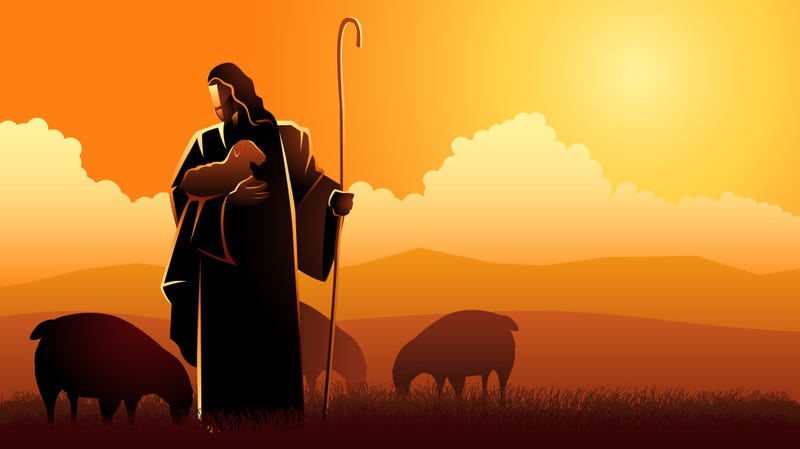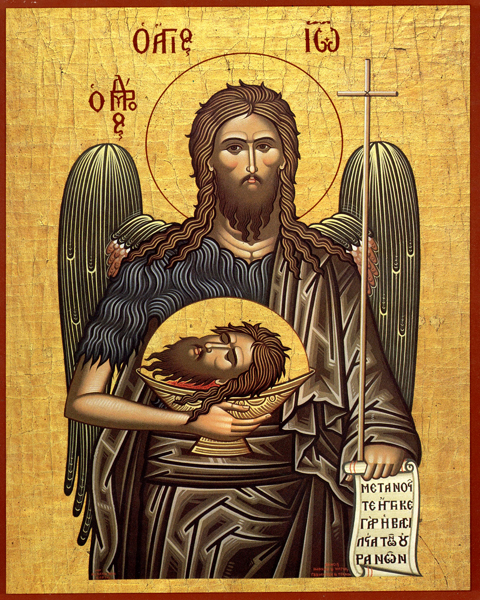Homily: Nativity of John the Baptist – July 7th, 2019
“There was a man sent from God, whose name was John. He came as a witness, to bear witness about the light, that all might believe through him. He was not the light, but came to bear witness about the light. The true light, which gives light to everyone, was coming into the world.”
We hear these words, a few among many read to us every Sunday, found in the final Gospel reading of the Divine Liturgy, taken from John chapter 1. Indeed he was sent from God and today we celebrate his being sent. Today we celebrate the Feast of the Nativity of the Holy, Glorious, Forerunner and Baptist John. He is the first joy sent to the human race by God. He is the voice of one crying in the wilderness, just as the prophet Isaiah foretold, a voice crying “In the wilderness prepare the way of the LORD; make straight in the desert a highway for our God …And the glory of the LORD shall be revealed, and all flesh shall see it together, for the mouth of the LORD has spoken.”
Regarding the Nativity of Saint John, Saint Ephraim the Syrian had this to say:
“He who was to baptize with water would proclaim him who would baptize with fire and with the Holy Spirit. The light, which was not obscure, would proclaim the Sun of Justice. The one filled with the Spirit would proclaim concerning him who gives the Spirit. The priest calling with the trumpet would proclaim concerning the one who is to come at the sound of the trumpet at the end. The voice would proclaim concerning the Word, and the one who saw the dove would proclaim concerning him upon whom the dove rested, like the lightning before the thunder.”
Saint John was the first prophet since the time of Malachi, with no prophetic word of God having been uttered for hundreds of years since then. God was silent. Now, the priest of the temple was also silent, having no voice to speak with, silenced by an Angel of the Lord.. Also, the King who ruled all of Judea was not even Jewish, and sat as a false and illegitimate king. These three offices, later fulfilled in Christ, were currently vacant (the prophets), silent (the priest), or without validity (the king). So, it was time to prepare the way for the coming of the Lord, and so he sent his prophet John, uttering those words we hear throughout the whole of the Old Testament: Repent!
The entirety of the Old Testament points forward to the coming of Christ. Saint John is the final voice of proclamation before His coming. John would baptize for the remission of sins, but Christ would come to remove them. Saint John would point to the Law, he was a finger pointing at God who exhorted all who would hear him to repent, for the Kingdom of Heaven is at hand. Then, the Kingdom of Heaven would arrive, and Christ would come to assume the mantle of the Law, becoming the Law of the Spirit of Life. John would orient us towards God, who would then come as the Son of God incarnate in the flesh, and we would be expected to follow. We would follow Christ because He is the Son of the living God, He is the Way, the Truth, and the Life.
The timing of the Forerunner’s birth, exactly half a year before the birth of our Lord Jesus Christ, depicts his mission and ministry of preparation, to prepare the way for the Lord. During this time of year, our days grow shorter after the Solstice of the summer Season. Looking forward to the birth of Christ, the days then begin to grow longer. We see embodied the living psalter of God, written across the colors and creatures of all creation, those words later spoken by John at the inception of Christ’s ministry: “He must increase, but I must decrease.”
The birth of Saint John is closely intertwined with the birth of our Lord. The aged Elizabeth gave birth to John, who would live to become the last of the prophets. The Virgin Mary was a young girl, who would give birth to He who is the word of God, the author of Creation, the breather of stars. Elizabeth, the daughter of Aaron, would give birth to the voice crying in the wilderness. Mary, the daughter of David, would give birth to the very voice and word of God. Elizabeth gave birth to he who would strive to reconcile men through repentance, but the Mother of God bore He who purify all of creation, an act completed by both John and Jesus through baptism – John through the baptism of Men, and Christ through His own baptism, sanctifying all the waters of creation. One would baptize with the waters of creation, and the other would baptize with fire and the Holy Spirit through which creation would be perfected and cleansed.
“Today the formerly barren woman gives birth to Christ¹s Forerunner, who is the fulfillment of every prophecy; for in the Jordan, when he laid his hand on the One foretold by the prophets, he was revealed as Prophet, Herald, and Forerunner of God the Word.”
~ Kontakion of the feast
Saint John is a prophet, but Christ has said that he is greater than a prophet. Saint John is but a man, but Christ has said “among those born of women there has arisen no one greater than John the Baptist.” For, as Saint John Chrysostom has said , indeed “he lived as though he were already in heaven, and having got above the necessities of nature, he travelled as it were a new way, spending all his time in hymns and prayers, and holding intercourse with none among men, but with God alone continually.” Saint John was the Forerunner of God both in life, and in death. He preceded the Son of God in life in this world, so would he also precede the Song of God in death at his beheading by Herod, another day the Church will remember later this year. Though I could find no writings saying as much, I believe that Saint John continued even in death his proclamation of repentance even in Hades. I envision him making straight the way of the Lord from this life into the next, preaching Christ to those who had not yet heard the good news, so that when the good news finally arrived, they were ready to accept it.
We who are the body of Christ are called like the forerunner to proclaim the miraculous and wonderful works of God, the good news of salvation, the healing of soul and body, and life eternal in Jesus Christ our Lord. We are called to follow Christ and incarnate the Love of God into the world created by Him, because the world knows Him not. We heed the words of the Forerunner, “Repent, for the Kingdom of Heaven is at hand,” for repentance begins our walk of faith as we turn Godward away from the things of this world. Our walk of faith brings forth the Kingdom of Heaven on earth as the Church serves to incarnate Christ into the world.
“O Prophet and Forerunner of the coming of Christ, we who venerate thee with love, are in perplexity how worthily to praise thee; for the barrenness of her who bore thee and the dumbness of thy father are loosed by thy glorious and precious nativity, and the incarnation of the Son of God is preached to the world.”
~Troparion of the feast
Oh glorious John the Baptist and Forerunner, may we deem to follow you on those paths you have lain straight in preparation for our Lord Jesus Christ, that we too should follow you into death, and unto life eternal.





:max_bytes(150000):strip_icc()/GoodFriday-157430484-5c7d8fe2c9e77c0001d19db3.jpg)

